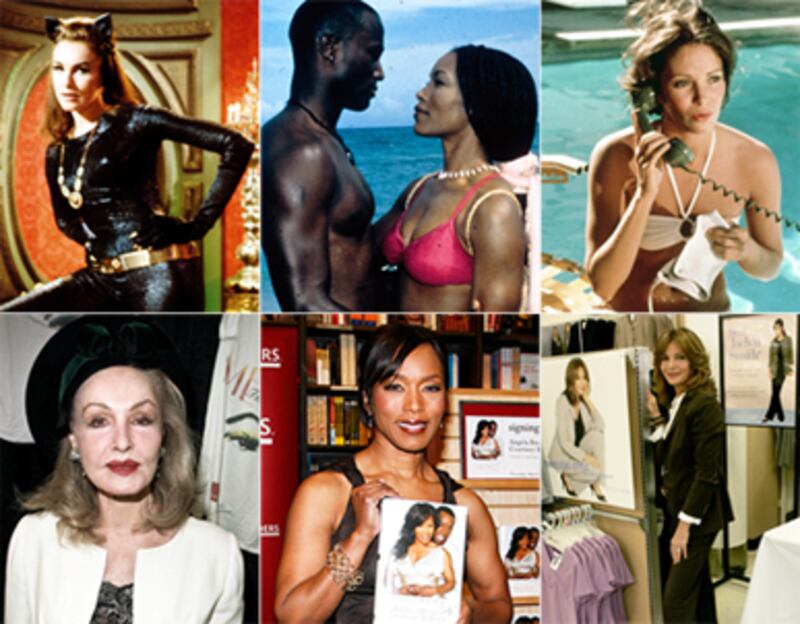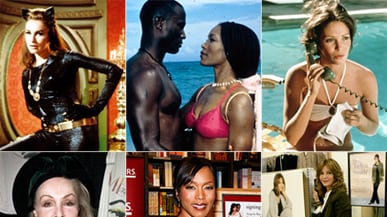Red, the Bruce Willis action movie about a group of old, retired Special Ops, recently crossed the $100 million mark at the worldwide box office. Earlier this year, another movie about maturing macho men, The Expendables, proved that a 64-year-old Sylvester Stallone is just as potent as a Rocky-aged Stallone. The film grossed $263 million worldwide.
The Hollywood lesson here is that old dudes, no matter how many blue pills and Botox shots are keeping them spry, are by no means past their sell-by date when it comes to the box office.
So what about their female equivalent—i.e., aging sex kittens?
To use a much-too-overused phrase: Not so much.
With the exception of enduring stars like Meryl Streep and Diane Keaton, it's no secret that as actresses grow older, the roles start drying up. It's incredibly sexist, certainly, but no one hides it. As PR veteran Michael Levine, who has represented Barbra Streisand and Michael Jackson, told The Daily Beast, "There is a very painful joke amongst elites in the entertainment industry, which says that as actors get older, they look like Sean Connery. The problem is that as women get older, they also tend to look like Sean Connery.
"It's very painful," Levine continued, "but you either have to make peace with it or continue to fight it for the rest of your life. It's a brutal fact and it places pressure on you to act differently, if you want to remain relevant both economically and socially."
So what are 52-year-olds like, say, Sharon Stone and Michelle Pfeiffer to do? According to one publicist, the answer lies in branching out into a "horizontally integrated economic model." In other words, rather than relying on one revenue stream (i.e., fees from starring in movies and TV shows), having a much broader portfolio that is based on several different income sources. There's the cosmetics line. There's the festival circuit, in which, in exchange for showing up at, say, the Singapore Sun Festival (where Stone is a featured guest this month, a star's travel and accommodation expenses are covered. There are the speaking engagements and personal appearances that rack up thousands of dollars for a few hours' work. There are the cruises. There are books.
Gallery: Actresses With Brands

Not to mention more underground tactics, such as the staged paparazzi photo, which the publicist calls "the quick, crack hit of the business."
"The way it works is that a star will call up the paparazzi and say, 'I'm going to be at the Beverly Glen Market in an hour. You're gonna get an exclusive.' Then the photographer sells the picture for $15,000, and the celeb takes $10,000."
Celebrities of all ages, of course, pursue a multimedia approach to career longevity (Paris Hilton is one very obvious example), but with older stars, it is driven more by financial necessity than the vanity of making headlines. It is also driven by fans' nostalgia. As agent Jackie Stander said of her 77-year-old client Julie Newmar, who played Catwoman in the 1960's TV version of Batman, "Julie is Batman, and Batman always exists."
“There is a very painful joke… which says that as actors get older, they look like Sean Connery. The problem is that as women get older, they also tend to look like Sean Connery,” says publicist Michael Levine.
As a result, Stander said, "Julie is always in high demand. She's working on a new book, she's really into her gardening. She makes personal appearances and people go goo-goo ga-ga over her—all over the U.S. and internationally. She's got a lot of cottage industries: boutiques, her shirt design, some art."
As to how to go about creating these cottage industries, Levine says: branding. "If the person is very well-known and not working much due to age, then what I attempt to do is figure out, first, what are their passions beyond their work and family. What do they love? Then, the second question is, what do they want to be remembered for?
"If you can get in touch with those, you may have the seeds of the emerging brand."
Naturally, no two brands are alike. Actress Angela Bassett, 52, is an author ( Friends: A Love Story), whose speaking fee ($50,000) is advertised online. Sixty-four-year-old Cher, who is arguably her own brand with or without the help of products, infamously made an infomercial a few years ago. But perhaps the most common pursuit for stars with pedigreed names is a jewelry or cosmetics line. Or, at least, the announcement that they are going to launch such a line, which both Lauren Bacall, who's now 86, and Demi Moore (48), have done in recent years.
"It can be a finite business, you have your window of time," noted one publicist. "So it's like—how do you keep your career propelled?"
Not everyone looks at it in such desperate terms, however. Jaclyn Smith, the former Charlie's Angel, is celebrating her 25th year with Kmart, with whom she has an apparel and home line. Smith, who is 65, got into designing not when her career was fading, but at the very height of it, and not because she needed to, but because it was a new challenge.
"I was under contract to Max Factor and Kmart called, and Max Factor said, 'It's not your audience.' I was busy. So I said, 'No,'" Smith said in a telephone interview. "They said, 'At least take a meeting.' And so I went in, took a meeting, and I saw this line, Hunter's Glen, it was like Ralph Lauren, very collegiate, all-American-looking, and I couldn't believe they could produce it at that price.
"They said, 'We really want you to do this and be involved in every aspect.' I just thought, I wasn't thinking in terms of a career choice or branding—the word branding wasn't on the tip of everyone's tongue. But I liked the people, I liked going into unknown territory, and I loved design. So I said, 'Yeah.'
"If you're a creative person, it's all under the same umbrella," she continues. "You try to keep yourself stimulated and productive and interesting. Are there a lot of roles out there today? No, there aren't. I did a Law & Order and it was great to get back out there and work as an actress, and work with incredibly talented people. But sometimes I'm offered a lot of the same types of roles, and if I'm going to do it, I want to love the role, really love it, and if I can't…
After a pause, Smith says, "I believe in backup plans."
Nicole LaPorte is the senior West Coast reporter for The Daily Beast and the author of The Men Who Would Be King: An Almost Epic Tale of Moguls, Movies, and a Company Called DreamWorks.





